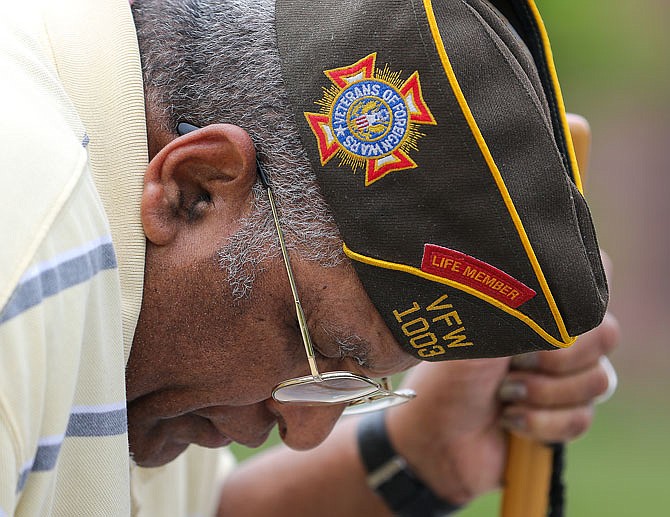With flashers on and the help of a police escort, a line of cars weaved their way through downtown Jefferson City on Saturday as part of the annual Juneteenth Heritage celebration.
Starting near the Capitol, close to 50 vehicles drove a planned route that ended in front of the Solider's Memorial at Lincoln University, which honors the 62nd and 65th Colored Infantries that helped establish the university.
The "Journey for Justice" motorcade kicked off this year's Juneteenth celebration, a holiday which honors the day in 1865 when Major Gen. Gordon Granger arrived in Texas to announce the Emancipation Proclamation, which President Abraham Lincoln had signed a full two and a half years earlier.
The actual anniversary and holiday is June 19, which is where the name "Juneteenth" comes from.
This year, the holiday came as protests and movements against racial inequality and police brutality continue around the world following the death of George Floyd in Minneapolis.
During the motorcade, many vehicles bore signs with phrases like "No justice, no peace," "Equal treatment under the law" and "I can't breathe," something Floyd was heard saying in the minutes leading up to his death in police custody. Black Lives Matter signs also dotted the procession.
The motorcade was the only part of the annual celebration that was held in person this year. After the vehicles disbanded, the afternoon was filled with virtual events streamed via the Jefferson City Juneteenth Facebook page and website.
Several speakers gave messages about Black history and the meaning of Juneteenth, as well as the continued challenges that Black Americans face.
Chike Akua, a professor and author, was the keynote speaker for the event. His message focused on education of Black history that many may not know.
Akua said many people prefer not to use the term slavery when discussing the period when African people were enslaved in the United States. Instead, Akua explained the usage of the word "Maafa."
Maafa is a Swahili term for the catastrophic interruption of African sovereignty and civilization - "meaning we were recognized throughout the world as a powerful people, but the Maafa interrupted that.
"Slavery is not Black history. It interrupted Black history," he said.
Akua said the Maafa recognizes that although slavery may have ended, that interruption continues to this day.
"What you need to understand about the Maafa is it's still going on - the suppression, the oppression, the lynching, the disenfranchisement, the terrorism," Akua said. "The Maafa is still going on. Don't get it twisted."
Akua used the explanation of Black history, including the Civil War and Emancipation Proclamation, to lay a foundation for the importance of Juneteenth.
For over two years after enslaved Africans were declared free by the proclamation, many were unaware of the news - including those in Texas where that message was delivered June 19, 1865 - and continued to be enslaved in the interim.
Akua also explained the difference between reform and reparations.
"Reform is reconstituting everything that was going on before which was not working. We don't want to go back to what was normal before," Akua said. "Reparations means there is a debt that is owed to us, and that it must be paid."
Akua said symbolic gestures of support from companies promoting Black Lives Matter and Juneteenth and removal of Confederate general statues from cities is good, but there needs to be more.
There needs to be more economic support of the Black community, Akua said, such as scholarships and funding for historically Black universities and colleges or funding housing.
"These are the types of things we need to be thinking about," he said. "How about we have funding to train up a new generation of teachers and leaders to teach our students in our cultural best practices? How about training up a new generation of counselors and therapists and psychologists who have been trained in our healing modalities as it relates to mental health, so we can begin to deal with the inter-generational, unaddressed trauma that has wrapped the Black community?"
Akua also shared four recommendations for listeners: buy from Black-owned companies, many of which can be found at BuyBlackMovement.com; grow some food and establish relationships with Black farmers; teach children; and protect your family.
Several other speakers followed Akua: Lincoln University professor Darius Watson, C.W. Dawson, Rev. Tammy Nobles and Richard Cross, speaking on a variety of topics relating to the Black community and history.
Due to some technical difficulties, the other speakers' pre-recorded videos did not play live but were uploaded to YouTube and posted to the Jefferson City Juneteenth Facebook page and website.
A compilation of entertainment clips from Black performers was also uploaded, including vocal selections, a dance performance from The Royal Tigerettes community dance team and a poem written by Andrea Kelley.
All of these clips can be found online for those who were unable to watch the events live.

